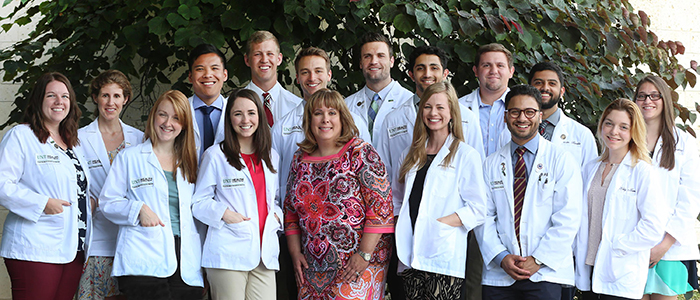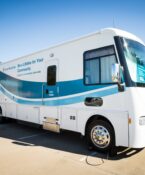Understanding addiction
By Jan Jarvis
Mir Ali is quick to acknowledge that asking patients personal questions about their alcohol or drug use can be tough.
But after spending a week at the Hazelden Betty Ford Foundation, the third-year student in the Texas College of Osteopathic Medicine said he feels much better prepared to address addiction issues with his future patients.
“What I learned there was that I have to have the courage to ask questions,” he said. “As a primary care physician, it will be important for me to do whatever I can to keep my patients from falling into the disease of addiction.”
Fifteen UNT Health Science Center students and one faculty member spent a week at the Hazelden Betty Ford Foundation in California, where they attended group therapy sessions, 12-step meetings and lectures. They also spent time with addicts and learned firsthand about the challenges they face.
Nearly one in 10 Americans over the age of 12 is affected by substance abuse. Yet primary care physicians, who see their patients most often and are most likely to spot addiction issues, often hesitate to broach the subject. That’s in part because most American medical schools provide just a few hours of training on addiction.
Through the partnership with the Hazelden Betty Ford Foundation, UNT Health Science Center is helping students understand addiction, how to talk about it and how to treat it.
As part of an immersion experience, Chrystyna Senkel, a UNTHSC instructor and the first physician assistant to attend the program, paired up with a veterinarian who had been an addict more than half of her life.
“I never thought of the potential for addiction in vets, but can entirely see it given that they are both doctor and pharmacist and have ready access to potent narcotics,” she said. “The nature of their work could really trigger an individual emotionally.”
Seeing firsthand how much people suffer with addiction had a profound effect on Sohail Kamrudin, a third-year TCOM student.
“I learned more from spending time with people suffering with addiction than I would ever learn from a PowerPoint presentation,” he said. “Seeing the gravity of this disease and the stigma around it was a formative experience for me.”
The program quickly separated stereotype from reality, Senkel said.
“Addiction looks like everyone and spares no one: corporate execs, longshore fishermen, prostitutes, housewives, physicians, dentists, etc,” she said.
Primary care providers are in a unique position to address addiction issues among patients, Ali said. But all too often, physicians are not educated about what to watch for. The program has left him feeling well-equipped to address addiction when he begins practicing.
“Addiction is a disease like any other,” he said. “It’s not the patient’s fault.”


![Uyen Sa Nguyen Scaled[58]](https://www.unthsc.edu/newsroom/wp-content/uploads/sites/16/Uyen-Sa-Nguyen-scaled58-145x175.jpg)



Social media